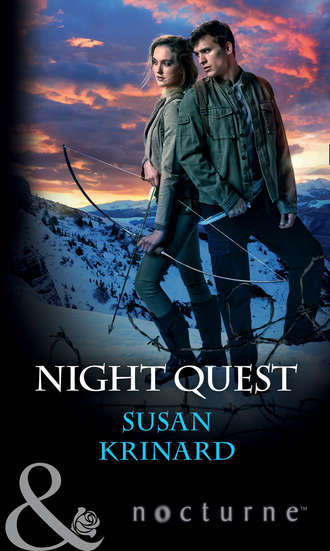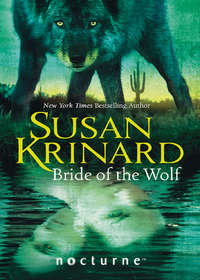
Полная версия
Night Quest

“Are you certain?” she asked softly.
“Look at me, Artemis.”
Whatever she saw in Garret’s eyes apparently frightened her, and she almost bolted. But he grabbed her hand, and she settled down again, panting and trembling. Her teeth penetrated his flesh. She moaned as his blood began to flow, and he felt desire take hold exactly as he had prayed it wouldn’t. He reached out to clasp his hands around her waist. He found the hem of her tunic and slipped his fingers beneath, sliding his palms over the skin below her ribs.
Then he paused, because she hadn’t asked for his touch, because he knew that she was not Roxana. But Artemis gripped his wrist and held his hand where it was.
She was too far gone to stop. And so was he.
SUSAN KRINARD has been writing paranormal romance for nearly twenty years. With Daysider, she began a series of vampire paranormal romances, the Nightsiders series, for Mills & Boon Nocturne. Sue lives in Albuquerque, New Mexico, with her husband, Serge, her dogs, Freya, Nahla and Cagney, and her cats, Agatha and Rocky. She loves her garden, nature, painting and chocolate … not necessarily in that order.
Night Quest
Susan Krinard

www.millsandboon.co.uk
With special thanks to my editor, Leslie Wainger, for her patience and editorial expertise; and to Serge, who will never give up on me.
Contents
Cover
Introduction
About the Author
Title Page
Dedication
Prologue
Chapter 1
Chapter 2
Chapter 3
Chapter 4
Chapter 5
Chapter 6
Chapter 7
Chapter 8
Chapter 9
Chapter 10
Chapter 11
Chapter 12
Chapter 13
Chapter 14
Chapter 15
Chapter 16
Chapter 17
Chapter 18
Chapter 19
Chapter 20
Chapter 21
Chapter 22
Chapter 23
Chapter 24
Chapter 25
Chapter 26
Extract
Copyright
Prologue
Some thirty years after the signing of the Treaty between human and Nightsider, or Opiri, forces, human Enclaves and Nightsider Citadels maintained a sometimes uneasy peace. Territories were well established, and the neutral Zones between were regularly patrolled by Citadel and Enclave agents.
The agents were of two specific genetic types. The half-breed Daysiders, or Darketans, day-walking Opiri, were born of human fathers and Nightsider mothers. Previously considered mutants, they had human coloring and extra-human speed and strength, but possessed the standard need for blood.
The half-blood dhampires, offspring of human mothers and Opir fathers, were of a different genetic type, with “cat-like” eyes and the ability to walk in daylight, while also possessing full Opiri speed, strength and acute senses. A percentage were dependent on blood, while some were able to digest human food.
Though both Daysider and dhampir agents were charged to prevent potential enemies from entering their respective territories, they could not prevent the establishment of illicit colonies.
In California, humans and progressive Opiri founded mixed settlements in which humans and Nightsiders could live in peace and cooperation. These new colonies were for the most part left alone by both Citadels and Enclaves. Farther north, in the former states of Oregon and Washington, humans established heavily guarded compounds inhabited by militias more devoted to killing stray Opiri than maintaining the peace.
Their victims were primarily exiled Opiri known as Freebloods. Most Freebloods were humans who had been bitten and turned into Opiri by powerful Bloodlords and Bloodmasters after the beginning of the ten-year War, first serving as vassals to their sires and then, after being replaced by other vassals, released from the bond created by the process of conversion.
Freebloods within the Citadels were forced to compete for human serfs in order to establish a Household and gain rank. But though, by treaty, the Citadels were compelled to send convicts to their former enemies, the supply of such convicts began to dwindle, and competition for the serfs became a significant problem.
As a result, hundreds of Freebloods were exiled from the Citadels to survive in any way they could. These Freebloods, running in packs, became a significant threat to human and mixed colonies, often stealing humans or killing Opiri colonists.
At the same time, certain Citadels began to see the necessity of changing the Opir way of life in order to deal with the ever-shrinking supply of accessible human blood. Some Opiri spoke of the need to abandon the taking of human blood in favor of animal blood, while others favored a new war. Meanwhile, the mixed colonies continued to grow and spread, offering a new alternative of peaceful coexistence based on the voluntary sharing of blood.
It was, of course, inevitable that these competing philosophies would come into conflict.
—from the Introduction to The Armistice Years: Conflict and Convergence
Chapter 1
Timon.
Garret Fox knelt beside the footprints scattered in the dirt, tracing the smallest with his fingertip. They had paused here, the kidnappers, and the little person to whom the footprint belonged had briefly touched ground before being swept up again.
Still alive, Garret thought. He dragged his hand across his face, scraping against the four-day beard he hadn’t had time to shave off, and got to his feet. Fear for his son made him ignore the deep ache in his muscles, the rawness of blistered feet, the heavy autumn rains that penetrated his coat and pried icy fingers under his collar. He hardly noticed the sting of the scratches across his face and hands where branches from trees and bushes had scraped his skin.
Speed had been far more important to him than caution. He wasn’t interested in concealing his trail. Neither were the rogues ahead of him. They felt safe now, nearly two hundred miles away from the colony they had raided. Safe because they had left complete chaos in their wake, and every adult human or Nightsider had been needed to clean up the mess and protect the other children.
The rogues believed they had nothing to fear from a single human.
Garret adjusted his pack, reassured by the weight of the VS-134 rifle—the highly effective and notorious weapon known as the “Vampire Slayer,” whose use was strictly forbidden except in cases of extreme emergency.
And that was why this had happened, Garret thought bitterly. Timon had paid for the colony’s philosophy of nonviolence and indiscriminate acceptance of every potential settler. Garret had no compunction about using deadly force to save him.
If Roxana had been alive, she would have done the same. Timon was all he had left, the only thing in the world that gave meaning and purpose to what remained of his life.
I will get him back, Roxana, he promised.
He set out again, though dawn was still hours away. Rain turned to sleet with the unseasonable cold. The moon was bright enough for him to see by, but he didn’t need to rely on it completely. He’d spent years not only honing his body and skills to fight enemy Nightsiders, but also in developing his senses of hearing and touch to help him move in darkness. The night would never be his element, but he had long ago reached a truce with it.
As darkness gave way to sunlight, he moved more quickly. As each day passed, the trail had led him deeper into wild country that seemed to grow colder with every mile, far from any human Enclave, Nightsider Citadel or free colony.
Time and again, he lost the trail and then picked it up, losing ground by night and gaining by day. Along the way he found the bodies of solitary humans drained of blood, their hollow shells cast aside, and each time he spoke a few brief words over the dead before he forced himself onward. His supply of dried foods shrank steadily, but he didn’t dare search for some isolated homestead or settlement to replenish his stores. He sought clean streams to fill his canteen, gathered edible greens and caught whatever game he could find.
At the end of the second week, his stomach hollow and his gait uneven with exhaustion, he knew he had fallen far behind. Still he drove himself on. He began to see more human settlements—not mixed colonies, like Avalon, but high-walled, paramilitary compounds with heavily armed militias whose sole purpose seemed to be hunting down and killing rogue Freebloods. Garret avoided them, as he had avoided the less warlike settlements he passed.
Fifteen minutes before dawn on the first morning of the third week, near what used to be the city of Eugene, he heard the distant sound of a woman’s scream.
He didn’t pause to think. Dropping to his knees, he shrugged out of his pack and removed the components of the VS. With shaking hands he assembled the rifle and looped its strap over his shoulder. If the woman was being harassed by Nightsiders, the Vampire Slayer might be all that stood between her and an ugly death.
* * *
The sound of a twig snapping brought Artemis to attention. She grabbed her bow, her hunt unfinished, and ran toward the denser forest and one of the many refuges she had built for herself in the area she had chosen as her territory.
If it hadn’t been for her hunger, she might have been clearheaded enough to notice the humans before she ran into them. If there had been one less human, she might have taken them down before they trapped her.
But there were five, all armed with automatic rifles, and they had thrown the wire netting over her before she could do more than raise her hands. Each segment of the weighted net was razor sharp, and though a thousand small cuts couldn’t kill an Opir, the damage would prevent her escape.
“You were right, Coleman,” one of the men said. “Never would have believed we’d find a female bloodsucker living alone out here.” He looked at the sky. “Just about sunrise. We might still get her back—”
“Why?” a younger man asked, holding his section of the net with thickly gloved hands. “She ain’t no spy.”
“Dean’s right,” a third human said. “She wouldn’t be out here alone near sunrise if she was. She won’t have no useful intel. Might as well take care of her here.”
Artemis barely heard their voices. The wire burned wherever it touched her skin and sliced through her clothing, but she tried to focus on calculating her best means of escape. One of these humans would surely be careless enough to loosen his grip on the net, giving her a few seconds to fight her way out. Blood loss might be great, but if she could grab even one of these monsters...
“Watch out!” the first male said as she lunged toward the loosest part of the net.
“Burn her!”
Something jabbed against Artemis’s neck, and a paralyzing shock jolted her nerves and froze her muscles. She felt her useless body being dragged across the ground and through the mud, the wires cutting deeper as the humans found a patch of dry earth far from any hint of shade.
The sky had grown pale in the east. The sun was minutes away from rising, and her body ignored every command her brain tried to send it. She was aware of increasing pain as the humans jostled the net and anchored it to the ground, driving stakes into the earth to pin its edges so tight and close that she wouldn’t find even the smallest opening.
Still, she tried. The paralysis broke, and she flung herself up and against the stinging web, cutting what remained of her clothes to ribbons and shredding the skin of her hands while the guttural laughter of the humans echoed inside her skull.
Then they stepped back, denying her what little shelter their shadows might provide, and watched the first rays of the sun strike her bleeding fingers.
She didn’t intend to scream. She fought it with all the discipline and self-control she had learned both in the Citadel and as an exile in the wilderness.
But her own cry deafened even the laughter of the humans, and the last thing she saw was the bright hair of a man with green eyes blazing like emeralds in the rising sun.
* * *
For a few fleeting seconds Garret considered the possibility of leaving the Opir woman to her fate. There were five men, all carrying modified assault rifles, and numerous knives and bladed weapons. It would be impossible to approach them without being seen.
He’d faced similar odds before and met them head-on. But he had expected a human woman, not a Freeblood. For all he knew, the female might be among the most vicious rogues in this patch of wilderness, as bad as those who had taken his son.
And if anything were to happen to him now, there would be no one to look for Timon. No one to save him from whatever fate the rogues intended for him.
But the militiamen were torturing the woman, and that was far beyond the pale of what Garret could accept. He had no doubt of what Roxana would have done if she were here.
Kneeling behind a screen of shrubs, Garret separated the VS into its component parts and returned them to his pack. Raising his hands above his head, he walked out into the clearing. Almost as one, the militiamen lifted their rifles and pointed them at his chest.
“Human,” Garret said in his mildest voice, trying to ignore the muffled moans of the Opir woman in the net. “Peace.”
Two of the men lowered their rifles. The others held steady. The eldest of the bunch, grizzled and scarred, stepped forward.
“Who are you?” he demanded, his hand on the butt of his hunting knife.
“My name is Garret Fox,” Garret said. “I’m looking for my son, who was taken by rogue bloodsuckers.” He glanced at the Freeblood in the net. “Have you seen any children in the area?”
The leader looked at his comrades. They shook their heads.
“We ain’t seen no kids outside our compound,” he said, his eyes narrow with suspicion. “Or any bloodsuckers except this one.” He kicked at the body curled up on the ground, and Garret fought the instinct to stop him. “Your son, you said? Where you from?”
Garret estimated that he had no more than a few minutes before the sun was high enough to kill the Nightsider woman. He didn’t have time for conversation.
“South,” he said. “I’ve traveled a long way.”
“Looks like it,” one of the younger men said. His eyes were small and cruel. “If bloodsuckers took your kid, he’s probably dead.”
“Shut up, Dean,” the grizzled man said. “How’d it happen?”
“We were out hunting,” Garret said, staying as vague as possible. “Maybe this female knows something. Will you let me question her before you kill her?”
There were murmurs of protest, but the leader silenced them with a wave of his hand.
“Get her out of the sun,” he ordered his men. He met Garret’s eyes. “You got five minutes. Here.” He tossed a shock stick to Garret, who snatched it out of the air. “Use this if she don’t cooperate.”
Garret edged closer to the leader as the other men dragged the net into the scant shade of a nearly leafless bush. “She probably won’t respond to more pain,” he said. “Let me tell her that you’ll give her a quick death if she cooperates.”
“Why should she believe you?”
“I was the interrogator in my compound,” Garret said. “Even with them, persuasion can be effective.”
“Why should I give her a quick death?”
“I didn’t say you had to keep my promise.”
The grizzled man bared his teeth in a grin. “Five minutes, like I said.”
“Thanks.” Garret turned toward the net, but the leader grabbed his arm with a callous hand.
“You got guts to travel out here by yourself,” he said, “and you look like a good fighter. You married?”
The grief was almost as fresh now as it had been four years ago. “No,” he said.
“Then you might be welcome to join us if you decide not to go back south again.”
“After I find my son, I may take you up on your offer.”
“My name’s Claude Delacroix. Find the old town of Melford and wait by the bridge over the creek. Someone’ll find you and bring you to the compound.”
“I’ll keep that in mind.” Garret pulled free, firmly but politely. “If you can keep your men away, I’d appreciate it.”
“Will do.” Delacroix gestured to his crew, cast Garret another assessing look and followed them.
Well aware that the militiamen were watching every move he made, Garret crouched by the net. The Opir woman’s pale skin was striped everywhere with narrow lacerations, her jacket and pants were little more than scraps of fabric held together by a few threads, and the hand tucked half under her chest was blistered and red. Her hair, a rich shade of ivory, was just long enough to cover her face.
No matter what she was or what she might have done, Garret thought, she didn’t deserve this.
“Listen to me,” he said, leaning as close to the net as he dared. “I can help you get out of here, but you’ll have to do exactly as I say.”
Slowly she lifted her head. Her eyes were dark amethyst, unexpectedly and extraordinarily beautiful. Her body was slender, her face delicate and fine-boned, but there was nothing weak in either. The defiance in her eyes told him that anyone who made the mistake of thinking her fragile would quickly regret their assumption.
“I heard what was said,” she said. “You are lying.”
The misery in her voice cut straight through Garret like the razor wires that cut her body. “Where I come from,” he said, “we don’t leave people to be tortured to death.”
“People?” she said with a brief, hoarse laugh. “Is that what you think I am, human? A person?”
“They obviously don’t think so,” he said, tilting his head toward the militiamen.
“You wish to interrogate me, but I have nothing to tell you.”
“Do you live in this area?”
Her full lips remained stubbornly closed.
“You don’t know anything about a pack of rogues with a human child?” Garret asked.
“No.”
“I know his kidnappers came this way, but I lost their trail. You must have sensed them.”
“I did not.”
“Where is the rest of your pack?”
“I have no pack.” She coughed, turning her face away. “If you have any of your supposed human mercy in you, let me have the quick death the other humans will never give me.”
“Is that what you want?” he asked. “To die?”
“I cannot help you. Why would you offer me any other alternative?”
He glanced over the top of the net. The militiamen were muttering among themselves. Garret’s five minutes were almost up.
“You have two choices,” he said. “Trust me, or force me to hand you over to them. And I don’t want your death on my conscience.”
She tried to brush her hair out of her face, but the movement cracked the burned skin of her hand, and her expressive eyes blurred with pain. “What do you want me to do?”
“What’s your name?”
“If it matters... Artemis.”
He showed her the shock stick. “Artemis, you’ll have to pretend I’m using this on you. Be convincing. I’ll flip the net back. You come out, grab me and drag me into the woods.”
“You believe I will not kill you?” she asked with obvious astonishment.
“Will you?”
“They will shoot both of us.”
“It’s possible. But I think I’ve persuaded them to believe that I’m one of them.”
“Yes. You are human.”
Garret held her gaze. “I hope you’ll choose to live.”
With another quick glance at the militiamen, Garret raised his voice in a harsh question and pretended to jab the stick into the net. The Opir woman began to convulse very convincingly, and as she did Garret grabbed two of the weights with his gloved hands and flung the net back over itself, leaving a narrow gap at the bottom.
Artemis was injured and in great discomfort, but she moved very fast, scrambling out from under the net, grabbing him by the shoulders and half dragging him toward the woods. He dropped the shock stick. Sunlight struck her, and she swallowed a cry. The weakness of her grip told Garret that she wouldn’t be able to keep up the pretense for long, so he made a show of helplessness, struggling as if she had complete control of him.
A bullet whizzed past his ear when they were still a few yards from the woods’ edge. Garret shouted and raised one hand in a plea as the woman continued to tug at him, her fingers beginning to slip from his coat.
“A little farther,” Garret said. “Once we’re inside the woods, run.”
Artemis stumbled, and Garret twisted to push her toward the trees. The militiamen were jogging after them now, deadly silent and ready to shoot. Garret and the Freeblood reached the shade, and she staggered, her breath sawing in her throat.
“Go!” Garret said.
“They’ll kill you,” she said hoarsely, refusing to move.
“For being an idiot and allowing you to escape? I don’t think so.”
She didn’t have time to answer, because the men were almost on top of them. Artemis grabbed him around the neck and dragged him deeper into the shadows. He could have escaped easily, but he played along, gasping for air and digging his heels into the dirt.
“Come no closer!” she shouted. “I will kill him!”
Chapter 2
The militiamen slowed to a walk. Delacroix signaled a halt. He met Garret’s gaze.
“I’m sorry,” he said, “but I can’t let her escape.” He lifted his rifle and aimed at the center of the woman’s forehead.
“She knows where my son is!” Garret rasped. “Let her go, please!”
Delacroix hesitated. “Your son is no more important than the people this bloodsucker will kill.”
“I will release him if you give me five more minutes before you follow me,” Artemis said.
Bending his head toward the man next to him, Delacroix spoke in a low voice, listened to his comrades and nodded.
“Five minutes,” he said, checking his watch.
Without warning, Artemis released Garret, pushing him toward the men, and sprang into a run. Almost immediately the militiamen started after her.
“Wait,” Garret said. “I thought you said—”
Delacroix signaled a halt. “You think we’d keep a promise to one of them?” he asked. “Don’t you want the info you say she has?”
“Yes, of course,” Garret said, rubbing his throat as he got to his feet. “But if you go into those woods after her, she’ll have the advantage.”
Two of the men aimed their rifles at him. “Who are you?” Delacroix asked again.
“A former serf from the Citadel of Erebus,” Garret said. “Do you know what that’s like? Any of you?”
The men exchanged glances. One lowered his gaze. Another spat.
“This is my fault,” Garret said. “Give me one of your weapons and I’ll get her myself.”
“She’ll have even more of an advantage over one hunter,” Delacroix said. “Why aren’t you carrying a gun?”
The VS seemed to burn a hole through Garret’s pack and into his coat. “I had one,” he began, “but—”
“Take off your pack,” Delacroix said.
“Why?”
“You’re hiding something, and I want to know what it is.”
Garret lunged at Delacroix, grabbed the man’s rifle in both hands, yanked it away and slammed the butt into the leader’s face. Without slowing, he struck the next man in the neck and then reversed the rifle.









